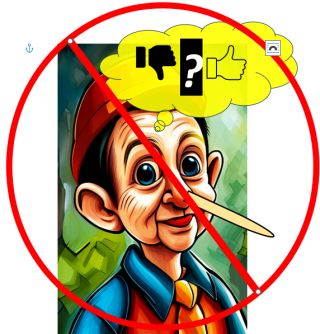Deception
Honesty Project Reveals New Truths About Misinformation
The science of how stop, look, and listen for honesty is expanding.
Posted January 30, 2024 Reviewed by Abigail Fagan
Key points
- Honesty ranks first among 60 characteristics that people like, respect, and want to know about others.
- White lies may not be harmless for the liar.
- Misinformation continues to influence people even when it's corrected.

From 2020 to 2023, Wake Forest University psychology professors commissioned research into the previously little-studied science of honesty. The Honesty Project considers how honesty shapes well-being.
Researchers used field studies, surveys, laboratory, and online experiments to increase public knowledge of how honesty affects daily life. Philosophy professor Christian B. Miller explained the importance of the study: “Out of 60 different characteristics, people ranked honesty number one in terms of what they liked, respected, and wanted to know about another person,” concluding that “honesty promotes trust, shows respect and prevents harm.”
Deceivers’ distrust
In three experiments, the researchers (Sprigings, Brown, & ten Brinke, 2023) found that deception not only breeds distrust and damages relationships between the liar and the lied-to but does so regardless of whether the lie is vindictively or socially motivated, whether or not the lie is detected, and even when the target of the lie is honest. This social phenomenon dubbed "Deceivers' Distrust" is automatic, because the liar, believing others are dishonest as he or she is, does not trust the one lied to.
Study participants randomly assigned to lie in a conversation, and people who report using deception most often, report less closeness with others and more loneliness than reported by honest individuals. Social connections diminish whether lies are motivated by vindictiveness or for relational reasons such as avoiding conflict or sparing feelings.
The researchers note that the social disconnect that occurs from telling white lies builds on earlier findings that people overestimate the benefits of kindness and underestimate the personal consequences of dishonesty, thus debunking the commonly held belief that white lies are harmless.
They cite two separate unpublished studies co-authored by Kwantlen Polytechnic University psychology instructor and Lifespan Cognition Lab Director, Dr. Daniel Bernstein, Simon Fraser, and Daniel Derksen presented at the 2023 Northwest Cognition and Memory Conference.
Research assistant Travis Takarangi interviewed hundreds of participants and found that people with the honesty-humility trait of being fair and genuine are more adept at understanding others’ perspectives than individuals with the personality trait of “agreeableness,” or putting others’ needs first. The intent to grease the wheels of discourse with white lies seems to backfire in favor of those who err on the side of honesty and genuineness.
Lingering influence
Not only can Individuals with the honesty-humility trait better understand the perceptions of others, but they are also better able to temper the negative “continued influence” effect of misinformation. In their review, “The psychological drivers of misinformation belief and its resistance to correction” Ecker, Lewandowsky, and Cook find that the continued influence effect is less likely to linger and lead to poor judgment and poor decision-making when corrected by individuals who exhibit the trait of honesty-humility. These reviewers share the findings that the science of honesty brings to those who wish to assess information and mediate the harmful effects of misinformation.
Misinformation intervention
Ecker, Lewandowsky, and Cook suggest that first, people may avoid spreading misinformation by recognizing that they may encounter not just relatively harmless misinformation, such as reporting errors, outdated information, and satire, but also disinformation campaigns designed to instill fear or doubt, discredit individuals, and sow division.
The reviewers explain that stopping the spread of disinformation “involves awareness that disinformation can be psychologically targeted through profit-driven exploitation of personal data and social media algorithms.” They warn that social media sharing without first evaluating content can amplify misinformation that not only confuses others but may financially enrich misinformation producers, and deepen ideological divides that disenfranchise voters, encourage discord, and harm democratic processes.
They recommend that when they engage with new content, individuals should slow down, think about why they are engaging, and evaluate their visceral response. They find that people who thoughtfully seek accurate information are better equipped to avoid misinformation.
In addition, misinformation information is more easily identified by considering the source, credibility, and motivation of the source, along with research into related messaging and content. Having found that information is incorrect and significant, consumers can mediate it by civilly, carefully, and thoughtfully correcting it where they meet it.
The Honesty Project leads the way to further validation of findings on honesty, teaching consumers to assess information, and thoughtfully correct it in order to support and elect leaders who are best equipped to listen and promote personal and institutional well-being.
References
Cohen, T., Fleeson, W., Furr, M., Tribble, H.W., & Jayawickreme, E. (2023). The Honesty Study. Wakefield University. NC. USA.
Ecker, U.K.H., Lewandowsky, S., Cook, J. et al. (2022). "The psychological drivers of misinformation belief and its resistance to correction." Nat Rev Psychol 1, 13–29 (2022). https://doi.org/10.1038/s44159-021-.
Bernstein, D., Fraser, S., & Derksen, D. (2023). “Honest people may understand us better, KPU psychology researchers find.” 24th annual Northwest Cognition and Memory Conference. Kwantlen Polytechnic University. Richmond. Surrey. BC. Ca.




